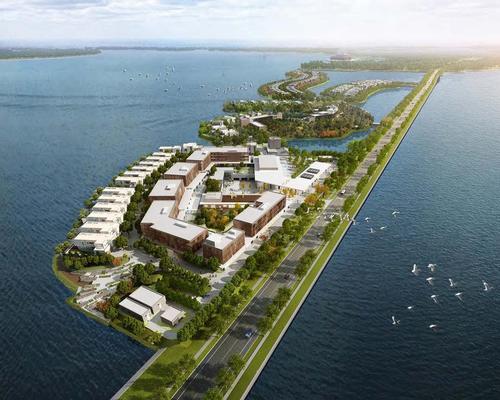22 Apr 2016
Architects Tsao & McKown design vast wellness resort for China
BY Kim Megson

Architecture practice Tsao & McKown are designing a 189,000sq m (2m sq ft) luxury wellness retreat along Yangcheng Lake outside of Suzhou, China, due to open in Q3 2016.
The project is being built through Octave – a development company owned by studio co-founder Calvin Tsao that is dedicated to creating wellness communities.
The retreat, called Sangha, will be comprised of residences, hotels and learning spaces. A 69-guestroom hotel offers a platform for wellbeing works, including an integrated medicine assessment and treatment centre, mind-body practice, coaching and counselling, spa, medi-spa and mindful dining.
Adjacent to the wellbeing hotel will be a village quarter that houses an executive education and learning complex, designed for deep group learning experiences.
The retreat will include a 6,000sq m (64,583sq ft) spa with treatments from massages to colonics, as well as a 1,200sq m (12,917sq ft) hammam, wet spa, steam room, saunas and night walks.
“Because the spa space is all about the environment and relocation and introspection it’s rather fantastical, I would say,” said Tsao. “It’s a subterranean space pierced with skylights – and the ceiling undulates. There are all sorts of bells and whistles.”
Sangha is heavily influenced by Confucian thought, including ideas of relationships with self, community, society and nature, which are incorporated in the design brief.
“Confucian thought is mainly about a methodology: priorities and values,” said Tsao. “These imbue the design process through the relationship between the different components. Suzhou is big, but it isn't a muscle-flexing, ‘look at me’ type of design. We wanted it to be retiring and introspective.
“In the design, the way we've organised spaces is meant to encourage congregation as well as individual contemplation, so there are quiet places, reclusive areas where people can retire for meditation and introspection.”
Octave has already built the Shanghai Living Room, a prototype and incubator for Sangha.
“We’re new to this and we needed to test drive it, so this was a small litmus test,” said Tsao. “It’s a microcosm, with everything surrounding an internal courtyard. There's a balance between inside and outside spaces.”
The Living Room features mind and body wellness programmes that are both about personal and group life-coaching, as well as children’s early learning courses, yoga, tai chi, boxing, nutritional counselling, and integrated Eastern-Western medicine clinic, and an eatery and standalone cafe that focus on healthy eating, with fresh ingredients from a rooftop farm.
Tsao said he’s interested in eventually bringing his work with Octave to other markets outside of China, and has his eye on upstate New York.
“We’re trying to take Confucianism out of the specific conditions of being a Chinese philosophy and take it to a more universal place,” he said. “These principles can apply to design almost anywhere.”
Close Window